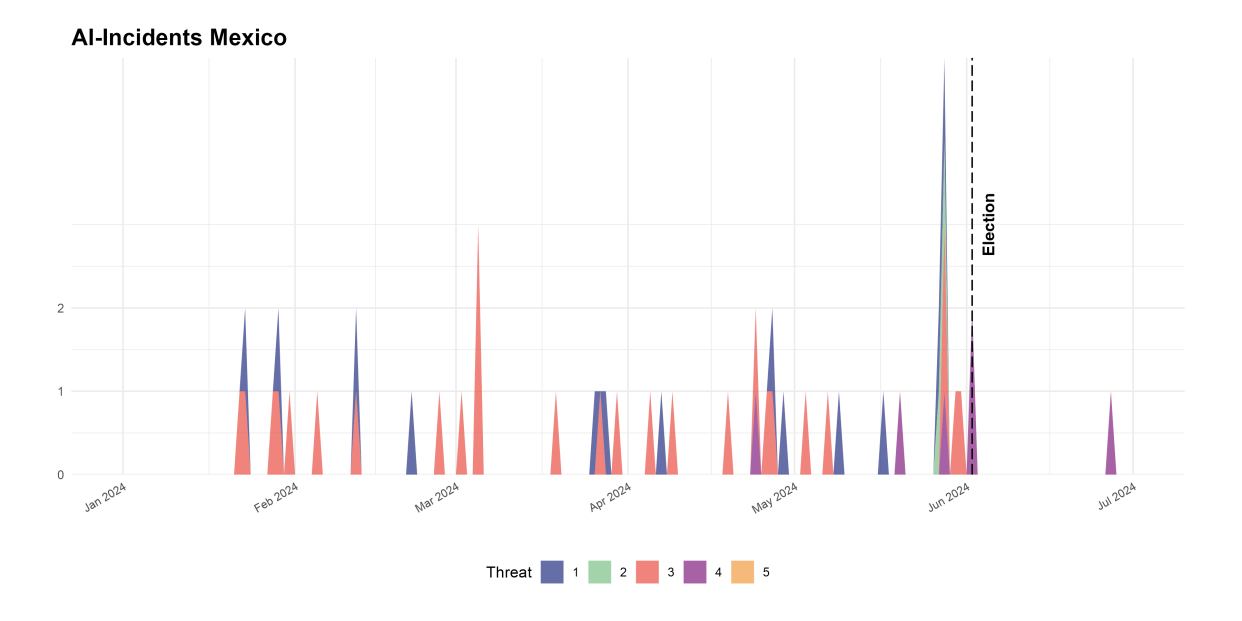While Mexico's 2024 elections showed limited AI impact due to dominant party politics, this relative immunity shouldn't mask the need for proactive AI governance in future elections—the focus must be on leveraging AI to strengthen democratic processes while addressing fundamental structural challenges to Mexican democracy.
The accelerated expansion and accessibility of generative Artificial Intelligence (AI) present both opportunities and significant concerns to democracy, particularly during elections. With nearly half of the global population voting in 2024, the question “Can AI undermine democracy?” has never been more pressing. For the case of Mexico, the Friedrich Naumann Foundation partnered with Eon Institute, a Mexican think tank, to identify emerging AI electoral trends and risks in order to inform the development of strategies designed to strengthen democracy and promote informed public discourse.
This text was first published by Friedrich-Naumann-Foundation. You can read the full Policy Paper by Claudia May Del Pozo and Daniela Rojas Arroyo here.
Explore the Data
AI-Incidents:
The election was held on June 2, 2024. The analysis of AI-related incidents, covering the period from January 1 to June 30, 2024, examined 5,934 news articles and identified 48 distinct AI-related cases.
Trends:
- Limited Use of Generative AI in Mexico's Elections:
-
The anticipated disruption of elections by generative AI did not materialize. Its use remained modest, mainly confined to low-cost deepfakes and voice cloning for political manipulation and opponent discreditation.
- AI used to reinforce/fuel established political campaigning strategies:
-
AI in Mexican political campaigns largely aligned with traditional, established methods, without introducing any new dimension to electoral campaigns.
- AI Technology facilitates Gender-Based Political Violence and Image Manipulation in Mexico; “Beautifying of Images”:
-
AI technology facilitated instances of gender-based political violence in Mexico: female candidates were disproportionately targeted through AI-generated non-consensual intimate content. Additionally, AI-generated photos have been used to "beautify" political candidates’ appearances.
- Insufficient AI-knowledge and Skills for implementation:
-
AI was employed largely experimentally due to limited understanding of how to effectively utilize the technology for political campaigning by politicians.
Proxy Variables, Visuals:
- Trust in News
- Source of News
- Social Media Usage
- Trust in Media and Government
Vulnerabilities:
- AI-generated misinformation outside the election periods
-
AI-generated content poses a vulnerability during electoral campaigns and outside electoral periods. AI-generated content can influence how political information is communicated and which topics are prioritized and widely discussed publicly.
- Decline of public trust
-
As illustrated above, trust in media in Mexico has fallen to 54% in 2024, marking a 2% decline compared to 2023, according to the Edelman Trust Survey 2024. This downward trend becomes even more pronounced when examining trust in news over recent years. Since 2019, trust in Mexican media has decreased by 15%, as highlighted in the Reuters Institute's Digital News Report 2024. These findings underscore a significant erosion of public confidence in media within the country.
- Hyper-personalization of political communication
-
The personalization and personification of political communication is a trend that has been apparent for the past years. When AI comes into play with this, AI can act as an accelerant to further increase the personalization to hyper-personalization.
- Verification of AI-generated Content (audio, text, visuals)
-
AI-generated content is becoming much harder to detect, both for the public and for researchers it is only a matter of time before verifying whether content was created using AI becomes almost impossible.
- Cyberattacks on Mexico's electoral infrastructure
-
AI can be exploited by threat actors for large-scale attacks on electoral institutions and the information space, posing a significant risk to democratic institutions. As one of the most critical vulnerabilities encompassing many of the above, this highlights the need for the securitization of Mexico's electoral infrastructure.






